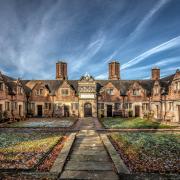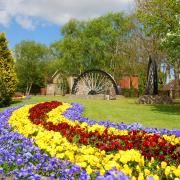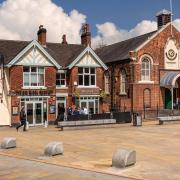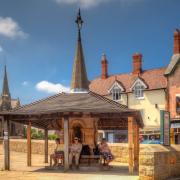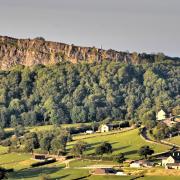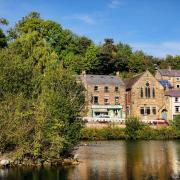Sally Mosley spends a day at the ancient mining court in Wirksworth and wonders – are women taking the lead?

The United Kingdom abounds with ancient customs, their creation often buried deep in the annals of long ago. Upholding these old ways and traditions is part of our rich heritage.
Lead mining was probably Derbyshire's first recognised industry, dating back thousands of years to when prehistoric man dug into our limestone hills using primitive antler picks. However, it was during the Roman occupation that lead ore was sourced on a commercial scale, smelted into giant ingots, stamped with the place of origin and then exported to Europe. By medieval times some Pecsaetan or Peakrill tribesmen had become accomplished miners of what was an extremely valuable commodity and Peak District settlements began to evolve on the proceeds.
During Danish, Saxon and Norman rule the United Kingdom was divided into specific areas with identifiable boundaries. Shire and parish are still familiar terms, but soke and wapentake or liberty are less familiar mining names and the soke and wapentake of Wirksworth was one of the richest of all lead mining areas. This is still apparent today from the countless lumps, bumps, dips and spoils of workings found all over neighbouring hills and dales, whilst underground remains a subterranean maze of shafts and tunnels.
To ensure mining lead was regulated by fair and legal practice, a court of law was established where disputes were settled, theft and trespass dealt with, new mines recognised and royalties known as 'lot and cope' paid to landowners. Legislation was introduced under King Edward I, setting out a list of Codes and Customs in the Quo Warranto of 1288. These were the rules that miners had to abide by. Initially there were 14 codes and customs, later expanded in the 14th century to 28 and then to 59 by the 17th century. In medieval Derbyshire two Barmote Courts were established, one held at Moyneash (sic) for the High Peak area and the other at Wirksworth for the Low Peak.

In 1653 Edward Manlove, a Steward of the Barmote Court, published a poem, putting the rules into 292 lines of rhyme:
By custom old, in Wirksworth wapentake,
If any of this nation find a rake
Or sign, or leading to the same, may set

In any ground, and there lead ore may get.
They may make crosses, holes, and set their stowes
Sink shafts, build lodges, cottages, or coes
But churches, houses, gardens, all are free

From this strange custom of the minery.
It rambles on satirically but includes a rather barbaric section on the punishment for theft:
For stealing ore twice from the minery
The thief that's taken fined twice shall be

But the third time that he commits such theft
Shall have a knife stuck through his hand to the haft
Into the stow, and there till death shall stand
Or loose himself by cutting loose his hand.
Tucked away down one of Wirksworth's narrow streets is the only official barmote courtroom still in existence. Built in 1814 it is known as the Moot Hall and in April this year I was honoured to attend the annual proceedings as an invited guest.
Resembling an unassuming Victorian chapel from the outside, the interior is similarly plain. The main auditorium was recently updated to offer comfortable seating for any members of the public who choose to attend. Years ago the Moot Hall was not a place for women, unless they had been summoned to appear. There is no barrier or bar as in a normal court but the room is dominated by a typical raised 'bench' at the front for a panel of four judges, led by a legally qualified Steward whose word is still law.
I was allowed into a back room, the inner sanctum of the Moot Hall, where a bevy of men dressed in Sunday-best suits and ties were chatting, laughing heartily, drinking ale and eating local artisan bread with Stilton cheese. The tradition of sustenance on arrival is as old as the court itself, introduced so that anyone travelling here on foot, by horse or carriage would be fed after their arduous journey. It is still upheld as part of the ritual.
The order of the court involves four proclamations. The first is when the jury is summoned by the bailiff: 'Hear Ye! Hear Ye! Hear Ye! All you men of good faith draw near.' He then warns the jurors that if they did not take their places they would be fined. This was my cue to sit on one of the visitor seats.
The Great Barmote Court for the Soke and Wapentake of Wirksworth 2019 was presided over by Michael R Cockerton, a local solicitor and Steward for an impressive 37 years. The Deputy Steward, Ms Suzanne Porter, is also a qualified solicitor and one of two women appointed to the post in May 2016 - the first in a long lineage of men. To their left was Mr Edward T Tennant, Barmaster since 2002. His role as court law enforcer is to oversee any decisions made, collect fees and manage all relevant matters throughout the year.
It is recorded that in 1665 the Barmaster was responsible for supplying a set of stocks for 'such persons as swear, curse or commit any other misdemeanour on the mine'. A challenging commission for a modern day joiner!
The final member of the top table is always a representative of Her Majesty The Queen as Duke of Lancaster, Lord of the Field and owner of vast mineral rights hereabouts. At this particularly historic event Mrs Debbie Garritty, Head of Communications for the Duchy of Lancaster, was the first female to fulfill this role. Yet another significant female precedent!
Positioned on a table before them was the ancient and impressive bronze standard dish, presented to the court in 1512 by Henry VIII, as described by a lengthy inscription on its sides. For centuries this valuable antique was the standard measure that miners' own wooden dishes were tested against. It is incredibly heavy when empty and can contain approximately 85 lbs of lead ore when full.
On the back wall beside the Duchy of Lancaster coat-of-arms were two plaques listing the names of the seven Stewards and seven Barmasters who have held the posts since 1783 - all male.
The court bailiff, Dave Mort, is the third generation of his family to be associated with the court. His father was bailiff before him and his grandfather was a Barmaster from 1931-1974. Positioned to his side were two rows of hard wooden pews where the 12 stalwart jurymen sat like a line-up of wise old sages. Also known as the 'Body of the Mine', the jury is made up of mine owners, mineral processors or men well-informed and knowledgeable in mining procedures, past and present. Their foreman, Jim Rieuwerts, is an eminent author, lead mining historian and the longest continuously serving juror with over 50 years' service. In the centuries-old history of this court there has never been a female on the jury to date!
The Steward then announced the start of this 'peculiar' court (meaning it is unique and specific to the lead mining institution). His address began 'I will not trespass on your time to recapitulate the laws as you know them well, but would remind the jurymen of their solemn oath to make sure justice is carried out and to preserve and maintain mine laws of Derbyshire - one body and with the same unanimity.' He went on to say 'Keep secret and do not disclose private matters and fear favours or reward. Tell the truth, the whole truth and do justice to the Queen and miners.'
The main purpose of the court nowadays, other than to uphold tradition, is to swear in the jurymen and their foreman who will legally act on the courts behalf for at least a year or until the next meeting. This procedure was fascinating to watch as one by one all 12 men declared their allegiance and kissed a Bible.
Years ago 'adventurers', who were shareholders or financiers who had sunk a shaft and discovered ore, would approach the court for permission to continue mining. As acknowledgement, a payment of their first full measuring dish was made, known as a 'freeing dish'.
Trespass was a common crime brought before the court. In the 1740s a case between the Royal Oak Mine and the Wall Founder Mine in Matlock was settled by the Steward John Calton who stated the following custom: 'Trespassers are to refund the ore got from the beginning without any allowance for getting. A miner's title arrives from his first possessing and stowes set on the surface preserve this possession.'
Very little business now takes place in the Barmote Court. Regulations are still upheld and fees collected but it's many years since the last fine or sentence was imposed. However, at this particular court hearing a member of the public was given the opportunity to voice concerns over the sale on the open market of an old lead mining rake deemed to be of both historic and important environmental interest. They hoped it would be bought by someone sympathetic to its heritage. Whilst the Steward said this lay outside the court's jurisdiction he was prepared to listen to their cause and acknowledged it.
At the end of proceedings the 4th Proclamation was read out: 'God Save The Queen, Duke of Lancaster.'
In years gone by members of the court and official guests would then make their way to a Wirksworth pub for a rustic meal washed down by flagons of ale. It would have been a raucous event with only men invited, each one being presented with a twist of black cherry tobacco and a clay pipe inscribed with their name. I was told that the knack to smoking one is to dip it in your drink first so the clay doesn't stick to your lips! Evidently a smog hung over everyone until the introduction of the no smoking laws meant tobacco was no longer provided. Surprisingly the clay pipes are still presented, supplied by Wilsons & Co (Sharrow) Ltd of Sheffield - established in 1737 and still selling snuff, tobacco and accessories. Sadly, the clay pipes are no longer being made so the court has only a few left which are presented to distinguished court members. Although Alan and Roger Furness from Hope, brothers and jurymen of nearly 30 years, are going to have a go at making some if they can get hold of the old moulds.
In recent years the luncheon has taken a more civilised turn. Women are allowed to attend and I was thrilled to be invited to a delicious three-course meal at East Lodge, Rowsley. The Barmaster also brought the Standard Dish, which was placed by a huge silver punch bowl given to the court by officers and members of the Grand Jury in 1977 to commemorate Queen Elizabeth II's Silver Jubilee.
After wining and dining, it was time for the speeches and our glasses were filled with the rather tasty punch - made by the bailiff from a 400-year-old secret recipe - for a string of toasts. Speeches followed from Steward Michael Cockerton; Debbie Garritty, who made history as the first woman to invite a toast; Barmaster Eddie Tennant, who mentioned the current success of fluorspar in world markets and that lead returns from Eyam would probably be paid this November for the first time in decades; jury foreman Jim Rieuwert, who referred to Youlgreave's William Hooson, writer of the acclaimed 1747 The Miners Dictionary; and finally the guest speaker, Brigadier C E Wilkinson, who told of his colourful life and family association with Bolsover pits.
The final toast was made, the last sip of punch taken. It was time for everyone to head home and for the Standard Dish to be returned to the safety of Chatsworth where it is securely stored. I did try to help carry it out but couldn't lift it off the table!
The survival of the Great Barmote Court is testimony to the dedication of those who attend. Michael Cockerton is planning his retirement and with Suzanne Porter likely to be the new Steward, this will be yet another first for women in a world once dominated by men. Hopefully with her in the lead the court will continue for years to come. u
My thanks to the Duchy of Lancaster and everyone involved in making it possible for me to attend this fascinating day.










